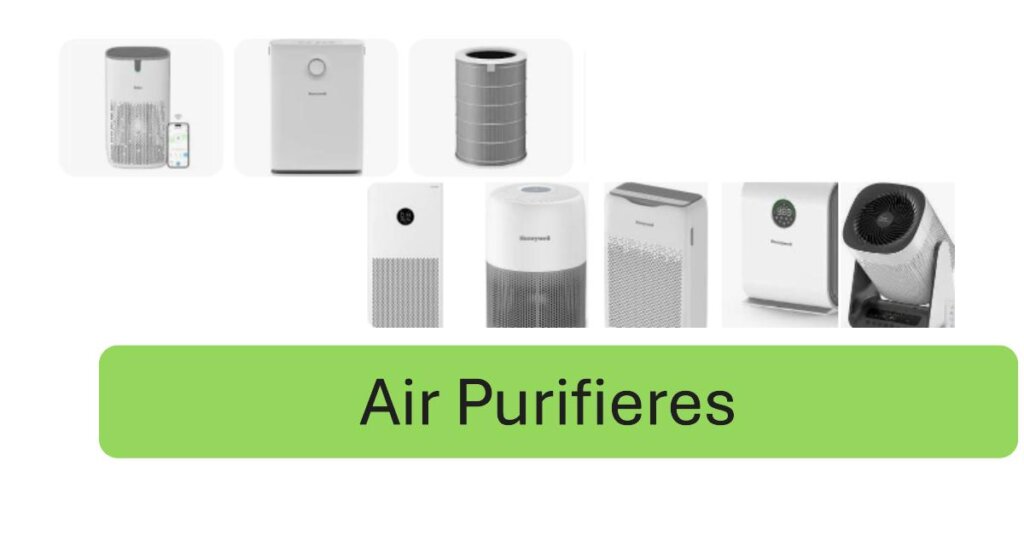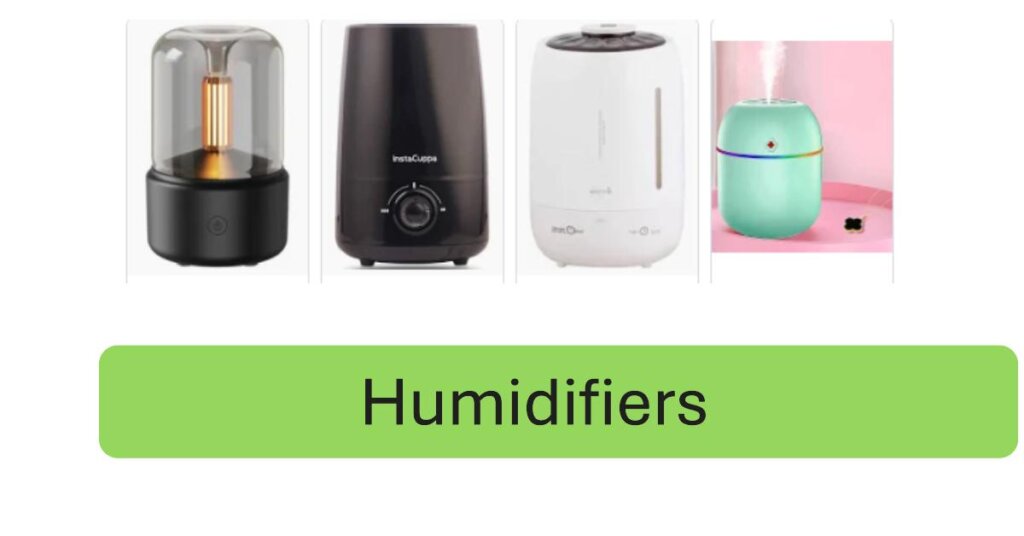A question that puzzles many is, “Is air purifier and humidifier the same?” This is a question many people ask when exploring ways to improve indoor air quality. Both devices are designed to create a healthier environment, but their functions are often misunderstood. While they share the goal of enhancing air quality, their mechanisms and purposes differ significantly, addressing unique aspects of air comfort and health.
As Air purifiers work by removing airborne pollutants such as dust, allergens, and harmful particles, ensuring the air you breathe is clean and safe. On the other hand, humidifiers are designed to add moisture to the air, making it less dry and more comfortable. Each device serves a distinct role, which is why understanding their differences is essential before making a choice.
According to the NIH, maintaining optimal humidity levels can help relieve symptoms like a stuffy nose or throat irritation, especially during colds or flu. However, it’s important to note that while a humidifier cannot cure illnesses, it can make symptoms more manageable by keeping nasal passages and throats hydratedanding the unique benefits of each device is key to selecting the right one for your needs.
Knowing whether to invest in an air purifier or a humidifier depends on your specific needs. If allergies, asthma, or pollution are your concerns, an air purifier can be a game-changer. Conversely, if dry air causes discomfort like cracked skin or irritated sinuses, a humidifier may be the solution. By understanding these differences, you can create a balanced and healthier living space.
What Do Air Purifiers and Humidifiers Do?
Both devices contribute to improving indoor air quality, but they work in completely different ways. Let’s break it down.
The Role of an Air Purifier
An air purifier is designed to clean the air. It targets harmful particles like dust, pollen, pet dander, and even pollutants such as smoke or mold spores. Advanced models, like HEPA filters or ionic purifiers, remove up to 99.9% of airborne contaminants.
Did you know? Some air purifiers even neutralize odors and harmful gases, making your home fresher and safer.

The Function of a Humidifier
On the other hand, a humidifier focuses on adding moisture to the air. This is especially useful in dry climates or during winter when indoor heating reduces humidity levels. Proper humidity can prevent issues like dry skin, cracked lips, and irritated nasal passages.

How Do They Work? A Quick Look at Their Mechanisms
Understanding their mechanisms gives us better clarity on whether air purifier and humidifier are the same or not.
Mechanics of Air Purifiers
- Filtration System: Captures pollutants through HEPA or carbon filters.
- Ionic Technology: Releases charged ions to neutralize particles.
- UV Light: Some models use ultraviolet light to kill germs.
These processes ensure the air you breathe is free from allergens and harmful particles.
Mechanics of Humidifiers
- Evaporative Humidifiers: Use fans to disperse moisture into the air.
- Ultrasonic Humidifiers: Vibrations create fine mist droplets.
- Steam Vaporizers: Heat water to release steam into the room.
While a humidifier doesn’t clean the air, it makes breathing easier by maintaining optimal humidity levels.
Key Differences Between Air Purifiers and Humidifiers
To answer “Is air purifier and humidifier the same?”, it’s important to examine their differences.
Purpose
- Air Purifiers: Remove contaminants to improve air quality.
- Humidifiers: Increase humidity to prevent dryness.
Health Benefits
- Air Purifiers: Ideal for people with allergies or asthma.
- Humidifiers: Perfect for relieving dry skin, sinus issues, or sore throats.
Environment
- Air Purifiers: Best for polluted or allergen-prone areas.
- Humidifiers: Beneficial in dry climates or during winters.
In short, the devices serve distinct purposes. Using them together might provide the best of both worlds.
When Should You Use an Air Purifier?
If you’re debating whether you need an air purifier, ask yourself the following questions:
- Do you suffer from allergies or asthma?
- Is your area prone to pollution or smoke?
- Do you have pets or young children at home?
An air purifier can significantly improve your indoor environment by removing allergens, pollutants, and odors.
Pro Tip:
Place your air purifier in rooms where you spend the most time, such as the bedroom or living room.
When Should You Use a Humidifier?
A humidifier is a lifesaver in situations like:
- Persistent dry skin or chapped lips.
- Difficulty breathing due to dry air.
- Keeping indoor plants healthy in low-humidity conditions.
Pro Tip:
Monitor indoor humidity with a hygrometer. Aim for levels between 30-50% for maximum comfort.
Can You Use Both Together?
Absolutely! In fact, combining an air purifier and a humidifier can enhance your home’s air quality. While the purifier cleans the air, the humidifier maintains an ideal moisture level.
Important Note: Ensure your devices are placed strategically to avoid moisture affecting the purifier’s filters.
Common Myths About Air Purifiers and Humidifiers
1. They Serve the Same Purpose
This is one of the biggest misconceptions. While both improve air quality, their methods and objectives differ entirely.
2. One Can Replace the Other
An air purifier cannot add moisture to the air, and a humidifier cannot remove pollutants. Both have unique roles.
3. They Are Only for Winters
While humidifiers are more useful during winter, air purifiers are beneficial year-round, especially in polluted areas.
How to Choose the Right Device for Your Needs
If you’re still asking, “Is air purifier and humidifier the same?”, let’s simplify your decision-making process.
Go for an Air Purifier if:
- You have allergies or respiratory issues.
- You live in an area with high pollution.
- You want cleaner, fresher air indoors.
Choose a Humidifier if:
- You experience dry skin, lips, or throat.
- Your home feels uncomfortably dry.
- You have wooden furniture or plants that thrive in humidity.
For maximum benefits, some people invest in a combination device that offers both functions.
How to Choose the Right Air Purifier or Humidifier for Your Workplace?
Selecting the right device for your workplace involves evaluating factors such as air quality concerns, room size, and specific needs of the environment. Start by identifying the primary issue—whether it’s excessive dryness or poor air quality. If the air feels dry, causing discomfort like dry skin or sore throats, a humidifier might be the solution. On the other hand, if allergens, dust, or pollutants are affecting employees, an air purifier is the better choice.
Consider the size of the workplace. Larger areas may require devices with higher capacity or multiple units for adequate coverage. Check the specifications of the air purifier for its CADR (Clean Air Delivery Rate) or the humidifier’s recommended room size to ensure efficiency. Additionally, workplaces with electronic equipment may benefit from a humidifier with a precise humidity control feature to avoid condensation risks.
Lastly, maintenance and noise levels are essential. Opt for devices with washable filters or easy-to-clean components, and ensure they operate quietly to maintain a productive work environment. By evaluating these factors, you can make an informed decision tailored to your workplace’s needs.
How do I maintain an air purifier and humidifier?
Proper maintenance of an air purifier and humidifier ensures they function efficiently and last longer. Here’s how you can care for both devices:
1. Air Purifier Maintenance
- Clean or Replace Filters: Check the filters regularly, typically every 1-3 months depending on usage and type. HEPA and carbon filters often need replacing, while some pre-filters can be washed.
- Vacuum the Unit: Dust and debris can accumulate on the unit’s surface. Use a soft cloth or vacuum cleaner to clean it.
- Monitor Filter Indicator Lights: Many air purifiers have indicator lights to alert you when the filter needs changing. Follow these cues for optimal performance.
- Placement Matters: Keep the purifier in an open area, away from walls or furniture, to ensure maximum airflow.
2. Humidifier Maintenance
- Daily Cleaning: Empty the water tank daily and rinse it to prevent mold and bacteria buildup.
- Deep Cleaning Weekly: Soak the tank with a mixture of water and white vinegar or mild disinfectant. Scrub off mineral deposits or limescale.
- Use Distilled Water: Tap water contains minerals that can lead to white dust and scale buildup. Distilled or demineralized water helps minimize this issue.
- Replace Filters or Wicks: For humidifiers with filters, replace them as per the manufacturer’s instructions, typically every few months.
- Monitor Humidity Levels: Use a hygrometer to ensure humidity stays within 40-60%, as excessive moisture can promote mold growth.
To ensure your devices work efficiently:
- Air Purifiers: Replace filters regularly and clean pre-filters.
- Humidifiers: Use distilled water and clean the tank weekly to prevent mold or bacteria buildup.
Regular maintenance keeps your devices running smoothly and prevents health hazards.
Conclusion
So, “Is air purifier and humidifier the same?” The answer is a definitive no. While both aim to improve indoor air conditions, their methods and purposes are entirely different. However, they can complement each other beautifully, creating a healthier and more comfortable living space.
Whether you need cleaner air or better humidity, understanding the unique benefits of each device will help you make the right choice.
Looking to create a perfect indoor environment? Check out our guide to air purifier maintenance and benefits of airpurifiers and humidifiers in allergies.
FAQ related to Is air purifier and humidifier the same?
Do I need a humidifier if I have a purifier?
Yes, you might need both. A humidifier adds moisture to dry air, while a purifier removes pollutants. They perform entirely different functions and can work together to improve indoor air quality.
Which is better, an air purifier or humidifier?
It depends on your needs. An air purifier is better if you want to remove allergens, dust, or pollution from the air. A humidifier is ideal if your home feels dry and you’re dealing with issues like dry skin, throat irritation, or sinus problems.
Is a humidifier or air purifier better for a cough?
If your cough is caused by dry air, a humidifier can help by adding moisture to soothe your throat. If it’s due to allergens or pollutants, an air purifier is the better choice to clean the air you breathe.
Does an air humidifier cool the room?
No, a humidifier doesn’t cool the room. However, evaporative humidifiers can make the air feel slightly cooler because of the moisture they release.
How do I know if I need a humidifier?
You might need a humidifier if:
Your skin feels dry or itchy.
You often wake up with a sore throat or dry nose.
The air in your home feels uncomfortable during winter.
Indoor humidity is below 30% (use a hygrometer to measure).
Can I use both an air purifier and a humidifier?
Yes! Using both can provide cleaner air and maintain the right humidity levels. Just make sure to position them apart so the moisture from the humidifier doesn’t interfere with the purifier’s filters.
DheerajSonwane is a dedicated writer with expertise in air purification technologies. He focuses on providing well-researched content to help readers improve indoor air quality in homes and businesses. As the lead writer at AirPurifierMaster.com, Dheeraj offers practical advice his insightful reviews guide individuals in choosing the best air purifiers for their needs.

